Ultimately the Marton career — which continues to this day — will not rival that of Nilsson’s. The two DVDs reviewed here give evidence of the power that Marton possessed at her best and of the weakness that kept her from truly assuming the Nilsson legacy.
Recorded at the Vienna State Opera house in 1989, this staging of Richard Strauss and Hugo von Hofmannsthal’s Elektra is one of the glories of live opera on film, deserving of eternal availability. The DVD picture has great clarity, despite the darkness of Hans Schavernoch’s set design. Other than the cliché of a huge statue head, toppled on its side, the set manages to be suitably representative of a decaying palace as well as an imposing, theatrical space, dominated by the mammoth body of the statue from which the head apparently dropped, draped with the ropes that seem to have enabled the decapitation. Sooner or later most of the characters cling to and twist around those ropes, an apt stage metaphor for the remorseless repercussions from the murder of Agammenon by his unfaithful wife Klytämnestra and her paramour, Aegisthus. Reinhard Heinrich’s costumes capture a distant era while sustaining a creepily modern look — part Goth, part homeless, part Spa-wear.
Director Harry Kupfer does brilliant work with the cast. Here Marton seems like a major stage performer. Her Elektra boils inside with hatred and disgust, but she can’t let it show. Marton’s impassive mask draws attention to the steely coldness of her eyes. When she recognizes her brother, Orestes, and knows that her wish will soon be fulfilled, she won’t allow herself conventional jubilation. Instead, she sinks back upon her brother and lets the fire die out of her eyes. Her dance of mortal joy at the end finds her wrapping herself in those ropes trailing from her father’s statue — she lived and died for him; there is no escape. Those who know Marton from her later years will be astounded by the firmness of her delivery — never wobbly, never shrieky. If we evaluate a performer by his or her best, Marton proves herself a great singer here.
Cheryl Studer finds a fire, too, in her Chrysothemis. Neither Kupfer or Brigitte Fassbaender will go for any ghoulish caricature for Klytämnestra, which makes her scarier. James King brings more of his heroic tone that one might expect at this stage of his career to the weaselly Aegisthus. Franz Grundheber is in fine form as Orestes, and Kupfer’s inclusion of Orestes at the end, covered in blood and both triumphant and aghast, ensures a shattering conclusion. Claudio Abbado gets a paradoxical performance out of the Vienna State Opera forces — both brutal and refined.

Five years later in San Francisco, Marton is just not the same singer as Turandot. She relies on conventional soprano diva mannerisms, but more damagingly, the voice has deteriorated. High sections are half-hooted, half-screamed, and extended notes flutter from semi-tone to semi-tone. Truthfully, a lot of Turandots sound like this, and many sound worse. Marton herself had established the measure of her abilities with the earlier Elektra; this is simply at a lower level.
The chief attraction here is as a recorded testament to the beauty and ingenuity of David Hockney’s sets. This classic production still gets trotted out (I saw it in San Francisco and San Diego in the early 2000s). However, film doesn’t capture its beauty and charm well. The stage picture is too dark, and frequent close-ups dim the theatrical effect.
Michael Sylvester seemed poised for a notable career at this point, and his Calaf has force as necessary and yet some sweetness of tone. Ian Falconer’s costume doesn’t flatter the tenor, who has a barrel chest and spindly legs. My sister and I had a debate as to whether Mr. Sylvester’s eyes cross at the high note of “Nessun dorma,” but only the wickedly curious will want to get this set to make their own judgment on that. The rest of the cast tends to the pedestrian — Lucia Mazzaria a forgettable Liu, Kevin Langan a prosaic Timur, and the singers of Ping, Pang, and Pong making their scene feel dreadfully long. Donald Runnicles seems to want the evening over fast, with many tempos just a bit too fast.
It is the classic Elektra for which Eva Marton should be remembered.
Chris Mullins

